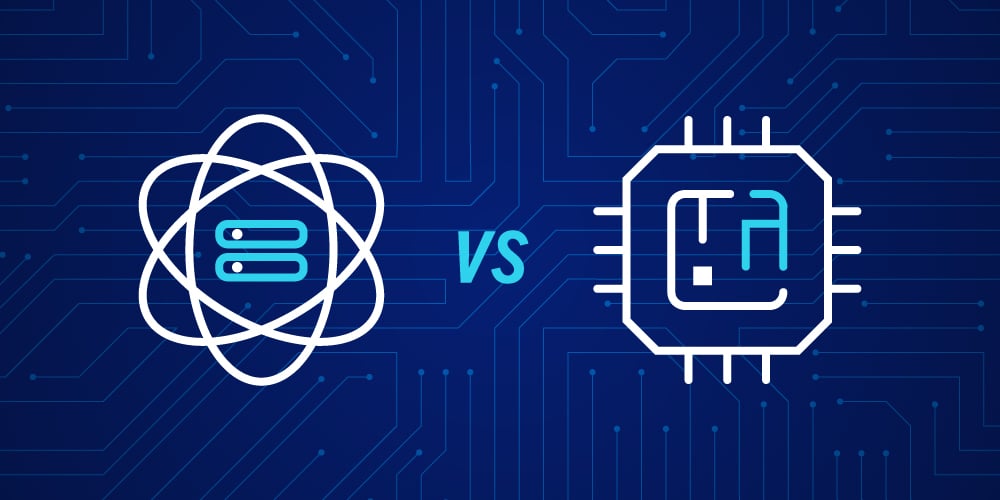Data Science vs Machine Learning: What’s the Difference?

Artificial Intelligence (AI) is changing the way we see the world across many industries. From Healthcare to Engineering and Financial Fraud Detection, the creation of intelligent machines is evolving rapidly to solve complex problems. AI is concerned with getting machines to do things that we would regard as requiring intelligence if performed by people. Within AI, there are many subtopics to explore and lots of modern technologies generating technological advancements.
Two closely related topics are Data Science and Machine Learning, both immensely popular buzzwords today. These two terms are often used interchangeably but should not be mistaken for synonyms. Although Data Science overlaps with AI and Machine Learning, it is a vast field with many different tools. Data Science is concerned with methods of analysis that allow people to gain insights from complex data. It encompasses statistics, data analysis, together with data quality, provenance, governance, ethics, and regulation. Machine learning is concerned with the learning aspect of intelligence in machines (e.g., our ability to learn a new skill or learn to recognise a new type of object).
Understanding the difference between these terms and how you can utilise them for your business and career is the first step to pushing the boundaries of best practice to drive business efficiencies and strategy processes. This article will outline the key differences between Data Science vs Machine Learning to give you a better idea about how each can be capitalised upon.
Data vs learning
Data Science is concerned with methods of analysis that allow people to gain insights from complex data. It encompasses statistics, data analysis, together with data quality, provenance, governance, ethics, and regulation. This entire process, plus the evaluation of the filtered data for building patterns and finding trends, enables recommendations to be made and optimisations to occur, generating business innovations. For example, when shopping online, someone might select preferences and filter products, resulting in a few recommended products – this process is a result of data science. Data Science overlaps with AI and Machine Learning.
However, whilst data science is based on the data, learning (e.g. our ability to learn a new skill or learn to recognise a new type of object) is the focus for machine learning, and that is where the difference lies. Machine learning is concerned with non-linear predictive models inferred from data and applied in a wide range of fields, including AI (e.g., for predicting protein folding from amino acid sequences, equity movements in financial markets, novel images of natural scenes). This enables a machine to generate powerful predictive models without handcrafting by humans. The model frameworks are quite simple in themselves, with the predictive power coming from the regularities in the data that they capture.

Insights vs predictions
At its core, data science deals with structured and unstructured data, aiming to use a scientific approach to extract meaning and insights from this data. This involves using data to find all viable solutions and then finding the best way to progress from these alternatives. Data science creates a system that interrelates these and helps the business to move forward. However, machine learning uses techniques to learn from the data and predict future outcomes.
Machine Learning involves a series of commands, details, or observations as inputs to prepare for potential predictions without human involvement. Machine learning and data science techniques can work synonymously. For example, data science might help to define recent problems that can be solved using machine learning techniques and statistical analysis, as opposed to structured and unstructured data.
Human involvement
Data science relies on human creativity and intuition to understand complex problems. Without humans, data science would operate on an incomplete picture. Data scientists in business work in teams to mine big data for information that can help to predict consumer behaviour and identify new opportunities. They also aid many organisations with setting best practice for the collection of data, using analysis tools and interpreting data. Some skills a data scientist might need are:
- Statistics
- Data mining and cleaning
- Data visualisation
- Unstructured data management techniques
- Programming languages such as R and Python
- Understand SQL databases.
This is because algorithms often struggle to grasp some realities that only the human mind can comprehend as they follow mathematics. For example, during the COVID-19 pandemic, certain algorithms could not understand the rationale for changing buying behaviours.
However, in machine learning, whilst human involvement can predict anomalies and manage the systems, it is arguably less so than data science, depending on the level of supervision. An unsupervised learning system is based on algorithms that learn from data with unlabelled elements looking for patterns or relationships between them. This does not require human involvement. However, supervised systems, which are based on algorithms that learn from data with tagged elements, require human involvement. This is because expected input and output data are provided. Therefore, algorithms can be classification algorithms, to classify objects within classes, or regression algorithms, to predict a numerical value. Someone monitoring these systems is called a Machine Learning Engineer, who requires skills such as:
- Computer science fundamentals
- Statistical modelling
- Data evaluation and modelling
- Understanding and application of algorithms
- Natural language processing
- Data architecture design
- Text representation techniques.
Discover how our team of experts have used Machine Learning to automate the building of 3D digital replica’s
Study AI online with the University of Leeds
Whilst data scientists and machine learning engineers fall into distinct categories, the required skills overlap, and data scientists may require skills of machine learning or vice versa. Whether you are a competent data scientist looking to specialise, or a specialist looking to broaden your knowledge, an Artificial Intelligence MSc can help you to face the future of the sector you wish to pursue. Purely AI-focused and covering an extensive range of AI and Machine Learning tools and techniques, this course allows you to apply your academic study and skills knowledge to the real world.

Did you enjoy this blog? Here's some related artificial intelligence content that you may be interested in:
Want to learn more about our online Artificial Intelligence course?

Check out the course content and how to apply.

